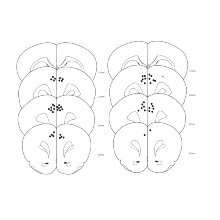Acute stress increases the willingness to take risks by stimulating dopamine receptors in the prefrontal cortex
Acute stress, e.g. in everyday dangerous situations or exams, causes a variety of physiological adaptations in the body and brain that help coping with such challenges. However, at times, some of these adaptive reactions prove to be detrimental. For example, in decision-making situations, humans and animals under acute stress often choose risky, unfavorable options. Which brain circuits and neurotransmitters are involved in altered decision-making under acute stress is still underexplored, in part because it is hardly possible to carry out such studies in humans.
In our work, we used rodents to investigate which signaling molecules of the body's own "stress system" promote risky decisions. In a behavioral task, the animals were repeatedly given the choice between two options: choosing option 1 always resulted in a safe but low food reward, while choosing option 2 led to a high food reward, however, the risk of non-reward increased considerably. The results show that a pharmacological increase in the blood concentration of the stress mediator noradrenaline increased risky choice. By contrast, a pharmacological increase in the blood concentration of the stress mediator corticosterone had only minor effects. In further studies, we analyzed brain mechanisms that underlie the increased willingness to take risks when noradrenaline levels are elevated. We found that elevated noradrenaline levels cause a massive stimulation of dopamine D1 receptors in the prefrontal cortex, which is a major cause of the observed increased risky choice. The prefrontal cortex is a brain region that supports complex cognitive functions such as decision-making.
Our results improve the causal understanding of the neural and neurochemical basis of decision-making. According to our data, dopamine D1 receptors in the prefrontal cortex play a key role in the control of risk-taking in decision-making under acute stress.
Supported by the German Research Foundation (DFG).


